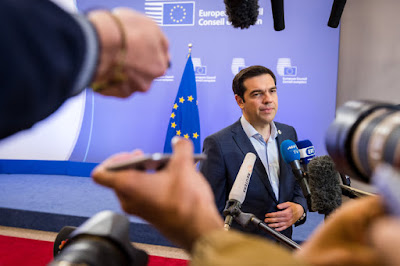[To Germany Greece Athens Greece
a
 |
Prime Minister Alexis Tsipras of
leaders in
|
BRUSSELS — Greece agreed to a deal with its European
creditors on Monday after long and bitter negotiations, swallowing substantial
new concessions in the face of imminent financial collapse and insistent
demands from Germany and other countries that it prove it
was worthy of a third bailout in five years.
The
agreement, announced after a contentious all-night session among leaders of the
19 nations that use the European common currency, requires Greece Europe and the International Monetary Fund.
If Prime Minister Alexis
Tsipras can push the
central elements of the package through his Parliament in the coming days — a
political challenge likely to prove difficult — the creditors said they would
be willing to open negotiations on providing as much as 86 billion euros, or
$96 billion, to keep Greece afloat for the next three years, and to consider
proposals to ease repayment terms on much of Greece’s existing debt of more
than €300 billion.
The
creditors also agreed, once terms of the bailout are settled, to pull together
a short-term stimulus program of up to €30 billion to help Greece
To Germany Greece Athens Greece
Either way, it appeared to remove the immediate threat of Greece Greece
“The advantages far outweigh the
disadvantages,” Chancellor Angela Merkel of Germany
“The country which we help has shown a willingness and readiness
to carry out reforms,” Ms. Merkel said, referring to Greece
The agreement said Greece
As part of Greece Greece
The Greek Parliament will also be required to approve the terms
of the agreement “without delay,” according to the document released on Monday morning. The
agreement requires passage of many of the changes by Wednesday and others by
next week.
The agreement specifies that
Greece must address a broad array of issues long pushed by the creditors, from
requiring the government to produce more reliable economic statistics to overhauling
the regulations for businesses including pharmacies, bakeries and ferries and
changing the rules for labor unions and strikes.
A
bleary-eyed Mr. Tsipras, speaking to reporters here on Monday, tried to put a
positive spin on what might be seen as an almost total capitulation by Athens Greece
“We
gave a tough battle for six months and fought until the end in order to achieve
the best we could, a deal that would allow Greece Europe .”
But any easing of Greece Greece
In an acknowledgment by the other eurozone countries that Greece
Donald Tusk, the president of the European
Council, who had convened the summit meeting, announced the agreement on
his Twitter account shortly before 9 a.m. He later used his Twitter account to write
that steps would be pursued “to swiftly take forward
the negotiations” on the latest bailout.
He added that eurozone finance
ministers would “as a matter of urgency
discuss how to help” Greece
Despite the agreement, Greek banks are expected to remain closed
this week. The banks are acutely short of cash and Greek depositors may soon
find it difficult to withdraw even small sums from A.T.M.s.
European stocks rose and the bond market calmed on Monday
morning just moments after European leaders said they had reached a deal. There
was no euphoria, however, as investors waited to see how the tough agreement
would be put in place.
Reporting
was contributed by Niki Kitsantonis from Athens, Alison Smale from Berlin, Jack
Ewing from Frankfurt, Anemona Hartocollis from Athens and David Jolly from
Paris.

